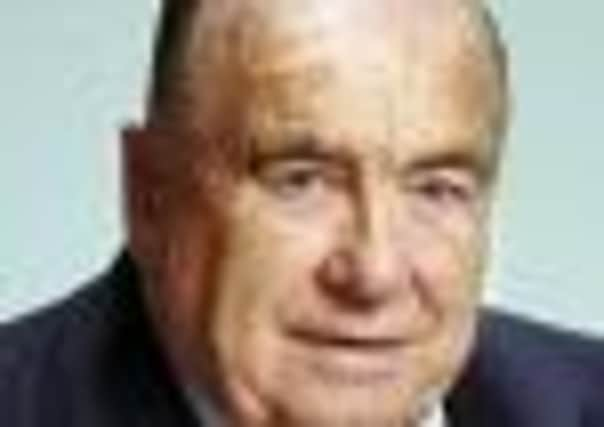Obituary: Malcolm Brodie, football journalist who covered 14 World Cups


FOR a man so associated with Northern Ireland, Malcolm Brodie never lost the Scottish accent that showed his true origins as a son of the Clyde. Though his speech acquired Irish inflections, his Scottish brogue never left him, and it made him a distinctive voice on television and radio.
By his diligence and longevity in the trade of football reporting, Brodie became known as Mr World Cup, even though Northern Ireland competed in only three of the finals he covered from 1954 onwards. True to his calling as sports editor of the Belfast Telegraph, a position he held for 40 years, he always found a local angle and, as Celtic manager and former international Neil Lennon recalled, “no-one was more pleased when Northern Ireland won a game than him”.
Advertisement
Hide AdAdvertisement
Hide AdKnown to friends and colleagues as Malkie, Brodie was the doyen of Northern Ireland sports writing for decades, hugely respected throughout Ireland and the UK, and much further afield for his friendliness, professionalism, willingness to help colleagues, and sheer hard work. His contacts book was legendary, and included such names as George Best, Jock Stein and Sir Alex Ferguson who this week paid warm tribute to his friend of 40 years’ standing.
In the worlds of journalism and football, Brodie remained friends with his colleagues and those whose activities he covered, largely because he was a straight talker and always supportive in times of need.
Born in Glasgow, a teenage Brodie and his brother were evacuated to Northern Ireland, from where his grandparents hailed, after German bombing raids on Clydeside.
Brodie started his newspaper career as a junior with the local in Portadown, County Armagh. He then gained a post with the Belfast Telegraph as a copy-taker, whose task was to take down the raw “copy”, transmitted via phone by reporters out on assignment.
In a traditional move in that era, he was invited to become a reporter and spent time on the news beat for the Telegraph, though his heart was not in the minutiae of council minutes and court cases.
His real love was writing about sport and, in particular, football. From the outset he showed a real flair for the task, and was a founder of the sports department at the Telegraph. Later he would edit Ireland’s Saturday Night, the province’s paper of record for weekend sport.
Brodie first attended the World Cup finals in 1954, when he had the sad duty of reporting on Scotland’s humiliating 7-1 defeat by Uruguay in Basle. He wrote: “The Scots, who had helped give the game to the world, were given a douche of cold reality and a signal they were not the power many of their patriotic fans imagined them to be.”
He also covered the infamous Battle of Berne that featured Brazil and Hungary in outrageous scenes of mayhem, with the burly Brodie actually inside the Hungarian dressing room as the crazed Brazilians tried to break the door down. He recalled: “Can you imagine a newspaperman loitering near the dressing rooms of a World Cup finals today? No chance. The nearest we get is the so-called mixed zone, where journalists wait behind wire for players to emerge from the stadium and be interviewed in an undignified scramble. I find this somewhat embarrassing, like waiting for crumbs of bread to be thrown to the starving.”
Advertisement
Hide AdAdvertisement
Hide AdThat experience in 1954 was the making of Brodie, who went on to attend World Cup Finals into the first decade of the new millennium. In 1982, at the World Cup in Spain, where Northern Ireland stunned the host nation by beating them, Brodie made a copy-taker for the Belfast Telegraph into a legend. Brodie recalled: “I started my match report ‘Magnifico, magnifico, magnifico…’ She said: “I heard you the first time.”
After his many years of service to the Belfast Telegraph – Brodie also contributed to many other publications – he was showered with honours in later life, including an MBE, and an honorary doctorate from the University of Ulster.
He was perhaps proudest of his special award from Fifa for his coverage of 14 World Cup tournaments in the form of a miniature Jules Rimet trophy, the original World Cup itself, named after the sports journalist who suggested the idea.
He took a truly global view of football on the Emerald Isle: writing about the game, north and south. His book 100 Years of Irish Football is testament to his evenhandedness.
He had been a youthful Rangers supporter, but was always aware of the footballing traditions of both sides of the religious divide in Glasgow and Northern Ireland, where he made his home in East Belfast. He wrote histories of both the Linfield and Glentoran clubs, a remarkable thing, given their Old Firm-style rivalry. He also took part in a documentary on Belfast Celtic, the club which died amid sectarian strife long before the Troubles themselves.
Brodie would appreciate that his obituary is being carried in so many newspapers. In a recent interview he joked: “I am writing so many obituaries people think I should be employed as a funeral undertaker.”
He is survived by his wife, Margaret, three sons, Iain, Steven and Kenneth, and grandchild Claire. His funeral service will be held on Monday in Belfast.
MARTIN HANNAN